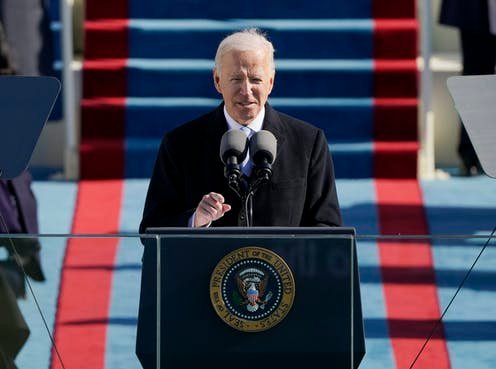As he settles down in Oval Office, Joe Biden is striving to differentiate his administration’s foreign policy from that of Donald Trump’s. That is understandable. The president of the United States has inherited an intense US-China rivalry from his predecessor and feels the need to stamp his own signature on the geopolitical, geo-economic curve that is reshaping the global balance of power.

However, even as Biden announces that “America is back” and claims “major shifts” in approach, early signals from the new administration on a key foreign policy tenet — bilateral ties with India — suggest more consistency and continuity with the Trump administration than Biden is willing to admit.
Right from the days of campaigning for the top job, Biden has said that he understands the true nature of the China challenge that has undergone a complete transformation since the time he demitted office as vice-president. This threat to America’s global hegemony arises from a rapidly powerful Beijing’s rapacious, coercive behavior and its vaulting ambition to shape the world in its authoritarian image. In his policy prescription, Biden has advocated a multilateral approach to tackle China as opposed to what he called Trump’s “go-it-alone” policy.
Contours of Joe Biden’s emerging Indo-Pacific and India policy mirror Donald Trump era
The emerging contour of Joe Biden’s China policy is predicated on a multilateral, issue-based approach with allies and key partners
This policy is presumably at a nascent stage of development, but we do get a glimpse of Biden’s approach from the comments, speeches and statements that he and his team have made since the inauguration. Axios reports, quoting NSC spokesperson Emily Horne that “from technology to global health to international economics”, “virtually every team” in the new administration’s National Security Council will incorporate China into their work as an example of Biden’s “whole-of-government” approach towards China.
During an address at the US Department of State on 4 February — his first major foreign policy speech since assuming office — Biden claimed a clean break with Trump’s ‘America First’ policy to take a more globalist approach.
https://www.imdb.com/list/ls089524371/
https://www.imdb.com/list/ls089524381/
https://www.imdb.com/list/ls089528758/
https://onlinegdb.com/HJL3djfbO
https://paiza.io/projects/RtniLM-zwpOT4RtbDL1s-A?language=php
https://jsfiddle.net/kepinajach/2x4u3gor/
https://webhitlist.com/forum/topics/joe-biden-raises-concerns-with-chinese-president
http://www.easymarks.org/link/190007/joe-biden-presidency-is-likely-to-deviate-from-trump-administration-on-foreign-policy
http://recampus.ning.com/profiles/blogs/joe-biden-didn-t-mangle-proverb-about-teaching-someone-to-fish
http://sfbats.ning.com/profiles/blogs/joe-biden-hands-off-for-donald-trump-s-second-impeachment
https://caribbeanfever.com/photo/albums/white-house-support-joe-biden-s-covid-relief-plan
https://ideone.com/FrXewW
https://controlc.com/1b7b6f51
https://pastebin.com/eaDmJF7H
https://paste.ubuntu.com/p/j9wVygXywC/
https://pastebin.freeswitch.org/view/c23ef9e7
https://paste.by/YJzVcRRJTI
https://paste.centos.org/view/964e5a6d
https://paste.ee/p/tmmgc
https://p.teknik.io/Ndo79
http://pastebin.falz.net/1852150
https://www.pastery.net/quhuya/
http://paste.debian.net/1185068/
https://paste.laravel.io/6d0074f4-ca24-4d9d-ae40-b01506753928
https://0paste.com/180433
http://paste.jp/2ec4e24a/
https://paste2.org/WKecc6sh
http://www.mpaste.com/p/e2QMnN
https://paste.in/obqmO5
https://paste.firnsy.com/paste/kuQsinc2xKG
https://paste.feed-the-beast.com/view/aa48119b
https://www.heypasteit.com/clip/0IVJPZ
https://paste.tbee-clan.de/x2qys
https://bpa.st/IBYA
https://justpaste.it/5bxen
http://paste.org.ru/?kevnbm
https://pasteio.com/xQV0fk6zEG2G
http://nopaste.ceske-hry.cz/360357
https://paste.toolforge.org/view/31966b88
https://www.dancehalldatabase.com/forum/Dancehall-Reggae/How-Joe-Biden-Handles-H1B-Or-Foreign-Worker-Visas/fe9de7041388eb8ed9ed759a00b3809c/11716
https://www.thewyco.com/general/how-joe-biden-can-bring-equity-to-home-ownership-11-02-2021
https://www.guest-articles.com/news/durbin-duckworth-prevent-biden-from-firing-chicagos-top-federal-prosecutor-11-02-2021
https://silinsung.tumblr.com/post/642831811527999488/donald-trump-left-behind-a-clemency-mess-joe
http://veterinaren.nu/forum/hund/148467/1/joe-biden-getting-beyond-the-minimum-wage-debate
http://beterhbo.ning.com/profiles/blogs/joe-biden-s-first-hit-at-china-as-president
http://divasunlimited.ning.com/profiles/blogs/president-joe-biden-making-bad-move-in-yemen-john-bolton-says
https://blog.goo.ne.jp/delonte32/e/6902a0509ffe4655d3e6bac8320be2aa
https://note.com/brittianyas/n/nfbc2c60e0850
He declared: “I want the world to hear today: America is back. America is back. Diplomacy is back at the center of our foreign policy,” and proceeded to stress that “America’s alliances are our greatest asset, and leading with diplomacy means standing shoulder-to-shoulder with our allies and key partners once again.” He called China “our most serious competitor” and vowed to “compete from a position of strength by building back better at home, working with our allies and partners, renewing our role in international institutions, and reclaiming our credibility and moral authority, much of which has been lost.”
In a subsequent CBS interview, published by the US news network on Sunday, Biden said the US “need not have a conflict (with China) but there is going to be extreme competition” and added, “I’m not going to do it the way Trump did. We are going to focus on the international rules of the road.”
The emerging contour of Biden’s China policy, therefore, is predicated on a multilateral, issue-based approach with allies and key partners. This is being hammered down the line by key members of his administration.
For instance, US national security adviser Jake Sullivan has called “revitalizing America’s alliances” a top priority of Biden’s foreign policy for the “United States to be able to deal with both great power competition and the transnational threats that the American people face”. Sullivan went on to add during a press briefing on 4 February that “once we have established this position of strength, we will be able to compete more effectively with our competitors across the board and especially with China, in every domain — economic, diplomatic, technological, security, you name it.”
We see this approach reflected in Sullivan’s conversation with his Indian counterpart Ajit Doval. The White House readout states that Sullivan and Doval “discussed the importance of continuing close cooperation in the Indo-Pacific region, promoting regional security, and renewing efforts to collaborate on global challenges, including COVID-19 and climate change.” In diplomatic parlance, “cooperation in the Indo-Pacific region, promoting regional security” and euphemisms for meeting the challenge posed by China in the Indo-Pacific theatre.